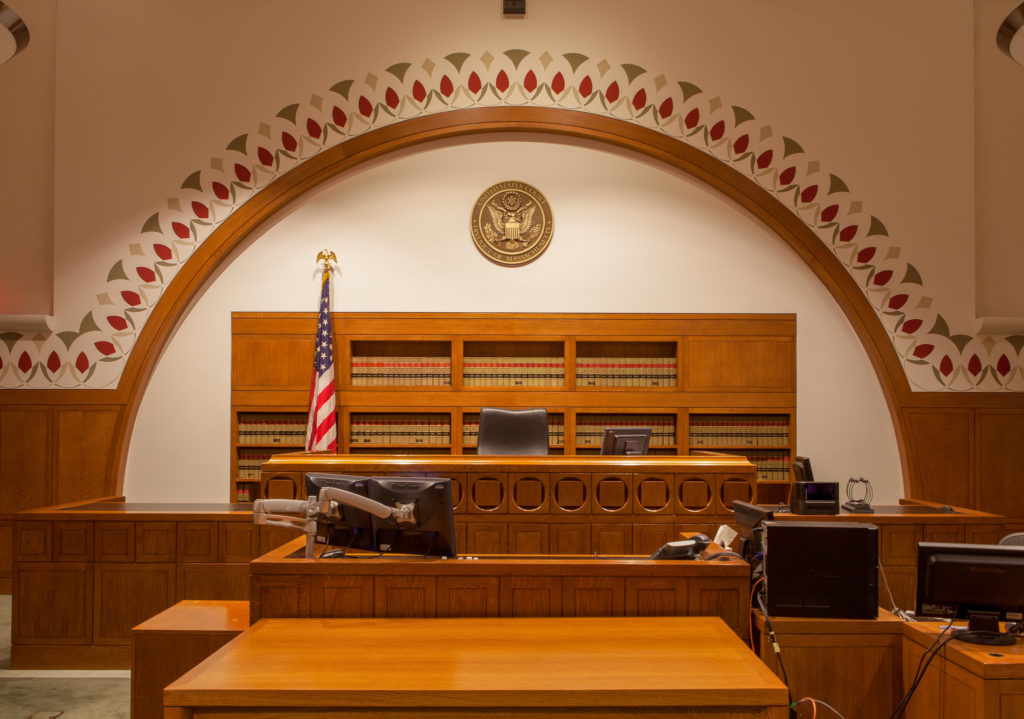
Inside the John Joseph Moakley United States Courthouse. (Photo courtesy United States District Court for the District of Massachusetts.)
BOSTON — Attorneys Jeffrey Angley and Robert Hopkins, representing Industrial Tower and Wireless, LLC., of Marshfield, squared off against Plympton Town Counsel Robin Stein and her co-counsel, Jackie Cowin, representing the Town of Plympton Zoning Board of Appeals before US District Judge Denise J. Casper – possibly best known for presiding over the infamous James “Whitey” Bulger case – in courtroom 11 of the John Joseph Moakley United States Courthouse in the Seaport District of Boston Monday, Nov. 26.
ITW is suing the Plympton ZBA, alleging their right to build a 120-foot, lattice-style cellphone tower at 0 Palmer Road, at the southwestern corner of Palmer Road and Center Street, which they now own, records say, was violated under the federal Telecommunications Act of 1996.
According to public records, the roughly four-acre lot was recently sold by Lawrence Marble, Jr. and Joy Marble, both of Halifax, trustees of ELBRAM Realty Trust, to Michael Umano, trustee of ITW Realty Trust, 40 Lone St., Marshfield, for $235,000. The sale was recorded with the Plymouth County Registry of Deeds Nov. 9.
The court proceedings were brief.
Casper held a commanding presence over the courtroom. Angley appeared at ease before the court and spoke more than the other three attorneys present. Stein was not as vocal as Angley. Neither of the co-counsels addressed the court directly.
The event, a scheduling conference, informed the court of the parties’ proposed schedule for discovery, disclosure and depositions. Casper worked amicably with the lawyers to finalize the schedule they had jointly submitted.
The lawsuit, filed in early September, will likely continue on through at least next summer, according to court documents.
Casper asked if there were any settlement prospects.
Angley replied that there were not. He said that most of these types of cases were disposed of by a judge with a summary judgement – an order ruling that no factual issues remain, and a complaint can be decided upon the facts by a judge without a trial.
ITW has a history of suing local government boards in federal court who have opposed them, according to court records. They have some history in Plympton, as well, as the ZBA decision denying them a permit to build their cellphone tower took several months to arrive at and they have had their eye on Plympton for “years,” according to testimony at the hearing in Plympton.
The communications company first came before the ZBA seeking zoning relief under the federal Telecommunications Act of 1996, which, according to Stein, was created to help build telecommunications infrastructure because most cell towers do not conform to local zoning bylaws in cities and towns across the nation.
According to Stein, the TCA of 1996 requires local zoning ordinances to be waived for a cellphone tower should a ZBA find that there is both a significant gap in cellphone coverage and that there are no alternate sites to locate it.
Stein warned the board that this type of case has been well litigated in the federal courts, in this circuit and others. However, there are examples where localities have prevailed against telecommunications companies in federal court on certain grounds, including aesthetics, such as the T-Mobile Northeast v. Town of Islip ruling of 2012 in the Eastern District of New York.
ITW made claims that 7,000 to 8,000 vehicles a day pass through an alleged 2.5 by 1.5-mile coverage gap. This was never independently verified, according to both ITW and town officials. ITW claims that it had been looking for “years” for a location to locate a cellphone tower and this one site was the only one of 36 they had exhaustively identified as suitable.
On Aug. 31, the ZBA voted down ITW’s application, 2-1, to build a tower on the business-zoned lot, surrounded by residential/agricultural zoned land, after multiple contentious hearings on the matter were held over the course of last summer.
Board members Dave Alberti and Harry Weikel voted against the tower, despite warnings by Stein that they were opening Plympton up to a federal lawsuit.
Board Chairman Ken Thompson voted for the project, with little visible enthusiasm, noting after that because the vote had to be unanimous, and he voted last, his vote didn’t matter. He then voted in favor.
During final deliberations, Weikel noted that he counted as 17 “significant” variances, not just the four in the application, that he believed the applicant required for the construction of a cell-tower. He listed other possible locations he found suitable, including several town-owned parcels of land.
The lawsuit takes special note of Weikel’s objections, stating in a document filed Nov. 16 that, “[a]fter the close of the hearing and during the Board’s deliberations, one Board member then recounted a series of properties that ITW allegedly should have considered but as to which ITW was given no advance notice nor opportunity to respond. The exercise establishes the hostility of the Board to ITW’s application and the utter bad faith tactics of the Board.”
Weikel, at a hearing in August, stated as previously reported by the Express, “I’m here to protect the people … that’s the only reason I accepted this appointment.”